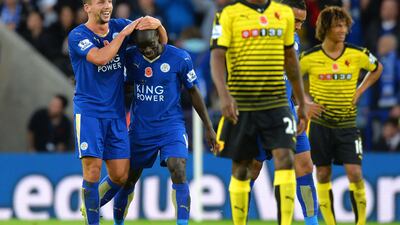There is a tweet that has been garnering plenty of attention.
It features a picture of Danny Drinkwater, surrounded by glowing tributes from Pele, Lionel Messi, Sir Bobby Charlton, Xavi, Pep Guardiola and many anothers.
Except the real object of their affections was Paul Scholes and Drinkwater’s name was simply substituted for another who began his career at Old Trafford, but who made 718 more appearances for Manchester United. Or, to put it another way, 718.
All of which was both amusing and harsh on Drinkwater, a deserving overachiever who has taken the roundabout route to first-team football at one of the superpowers.
He completed a £35 million (Dh167.4m) move to Chelsea on deadline day. His debut could come against his old club Leicester City on Saturday.
It is a move that is both eye-catching and entirely understandable.
Read more
Chelsea losers and Swansea winners: Premier League transfer business report card
Six problems that Chelsea need to address to get back on track
Eden Hazard has faith in Chelsea squad to win trophies
Chelsea technical director Michael Emenalo rationalised it by saying: “Danny is not only a Premier League winner but also has Champions League experience which will be invaluable.”
He is also a player with a track record of dovetailing beautifully with N’Golo Kante.
Yet he cost £30m more than the departing Nathaniel Chalobah and it is a moot point how much better he is than the Watford newcomer.
He was being kept out of the Leicester team by Matty James and Andy King for swathes of the 2014-15 season.
He did reasonably alongside Wilfred Ndidi in the second half of last season, but scarcely seemed a high-class footballer when paired with Daniel Amartey.
One conclusion from his career, reached long before it seemed Chelsea may reunite them, is Drinkwater might only be a particularly good player alongside the irrepressible Kante; another that, like many of his former Leicester teammates, he played above himself in an extraordinary year.
Emenalo highlighted the other reasons for his arrival for his last week. “He is a typically combative English midfielder with a cultured passing technique and his arrival significantly strengthens our midfield options,” said the Nigerian.
His nationality played a part: Chelsea were only able to name three others who qualify as homegrown in the squad they registered with the Premier League, leaving them four short of the full 25-man quota.
Meanwhile, Jamie Vardy benefited from his quick, vertical distribution. Drinkwater’s long passing range opens the possibility that he could release the similarly speedy Alvaro Morata from deep.
He will, however, have to get used to playing for a side who have the ball for the majority of the time – Leicester averaged 43.7 per cent of possession last season, Chelsea 54.0 per cent – and who cannot just rely on a counter-attacking blueprint.
Drinkwater only completed 77.4 per cent of passes himself last season, a figure that will have to rise at Stamford Bridge.
And, as Emenalo accepted, Chelsea need strength in depth. Kante and Tiemoue Bakayoko are their premier defensive midfielders, Cesc Fabregas their best playmaker.
Drinkwater is not as destructive as the former pair or as constructive as the Spaniard. But the lack of a fourth central midfielder meant David Luiz was pressed into emergency service further forward when the banned Fabregas missed the Tottenham Hotspur game.
Alex Oxlade-Chamberlain might have helped fill the void, but he rejected Chelsea to prefer Liverpool.
Drinkwater looks a back-up and, in a rather undiplomatic way of saying he welcomes competition for places, new teammate Bakayoko stated: "Danny Drinkwater doesn't scare me.”
Perhaps not. But if United have cause to rue letting him leave for just £1m, it is no guarantee he will establish himself in the rarefied air of the elite clubs.
Yet if his chemistry with Kante is apparent again, he could shed the tag of a one-season wonder.
Subscribe to iTunes to download all of The National's Extra Time podcasts


